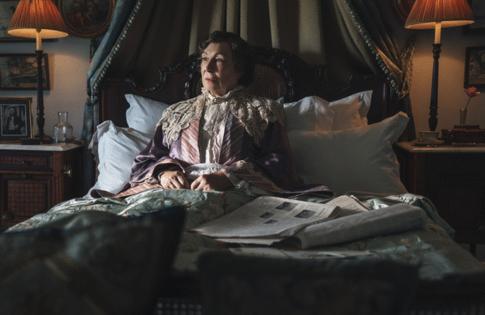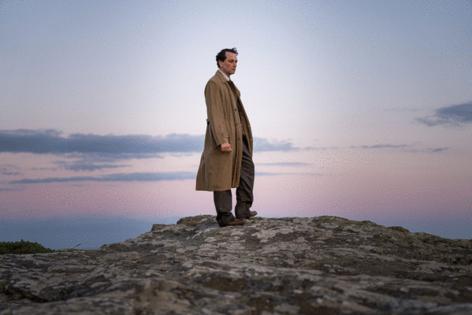'Towards Zero' review: The real murder is what they did to the Agatha Christie original
Published in Entertainment News
Why adapt a murder mystery if you don’t care about the mechanics of the story to begin with? I ask myself this often when it comes to the work of Agatha Christie, and the question was ever-present throughout the three-part series “Towards Zero” on BritBox.
I’ve been making my way through Christie’s books for the past year or so (70-plus novels, not even counting the short stories) and the qualities that make her such a fun read — or fun listen; the official audiobooks narrated by actors are terrific as well — are rarely in evidence when it comes to newer film and TV versions, which fail to capture her voice. They’re usually too serious and given a “prestige” patina that feels simultaneously undercooked and overdone.
Christie wrote until her death in 1976 (well, almost; her last novel was published in 1973) and her books incorporated subtle details reflecting the changes happening around her. And yet when those same stories are adapted into TV or film, we’re invariably trapped in the 1930s. Specifically, a glamorously imagined version of the ’30s. That’s true here as well. “Towards Zero” was published in 1944 but the setting has been changed to 1936. That’s my first beef.
The original book opens with Christie dropping breadcrumbs that introduce seemingly unrelated characters — whose importance will be revealed later — before getting to the main players at hand. All of that prologue is gone in this version, which makes sense. Condensing a novel isn’t easy. What to keep in? What to leave out? But too many changes to the story itself are fundamentally at odds with the spirit of Christie’s writing. The result is airless. Aimless, even.
Like so many of her stories, this one takes place at a palatial estate and centers on a divorced couple named Nevile Strange (Oliver Jackson-Cohen) and Audrey Strange (Ella Lily Hyland) who split up when he fell in love with a petulant woman (Mimi Keene) he subsequently married.
When the exes run into each other one day in London, they decide to spend a few weeks together over the summer — along with Nevile’s new wife — at the coastal Devon estate of the imperious Lady Tressilian (an excellent Anjelica Huston). It’s where they grew up and the inclination to return makes sense to them, if to no one else. The divorce was ugly and yet here they are, playing nice. How … civilized. But then murder ensues. In the book, police superintendent Battle happens to be enjoying his own holiday nearby, so he’s pulled into service to find out whodunit.
Christie wrote five novels featuring Battle as the primary sleuth, including this one. But adapter Rachel Bennette has other things in mind, excising Battle entirely, replaced by Inspector Leach. Christie readers will recognize the name; he’s Battle’s nephew, who is also a police officer stationed nearby and therefore Battle’s right-hand man on the case. But nothing about this Leach, played by Matthew Rhys, resembles the original. Instead, he’s a despondent war veteran in need of a shave.
Reshaping Leach into a man grappling with (presumably World War I-era?) shell shock and survivor’s guilt feels random, but then, what here doesn’t? Clarke Peters, of “The Wire,” is also part of the ensemble as a guest staying at the house. He’s Lady Tressilian’s lawyer and yet another character whose story contours have been changed for reasons that do not play out in fruitful ways.
Fidelity to source material can be a trap. But change just for the sake of change isn’t the answer, either. Consider the problems created by this version of Leach. Narratively, a police detective has no reason to be around until a murder takes place. But you don’t cast an actor like Rhys and then sideline him for the first hour. Even so, the series struggles to explain his presence in the early going. More to the point, this guy? Not how Christie viewed the police. They lack the elegant intelligence of a Poirot or a Marple, but they are not anguished — they’re too stolid, too uninteresting for that — and it’s a reimagining that adds no depth to the proceedings.
To encounter Christie today means recoiling from some her worst instincts (the racism for one, which was either her own or simply that of her snootiest characters) and I’m not arguing for that to be retained. To be clear, that’s not an issue with this version of “Towards Zero.” But she had a sly humor that tends to get lost in adaptations. She wasn’t interested in melodrama so much as the messier outcomes of people who fail to see eye to eye, sometimes with violent results. In the novel, Battle makes an observation. “It’s extraordinary the amount of misunderstandings there are even between two people who discuss a thing quite often — both of them assuming different things and neither of them discovering the discrepancy.”
Conflict is avoidable except when it isn’t, because humans tend to be such terrible communicators. This adaptation has no curiosity about any of that. And it eliminates an important reveal about the real reason Nevile and Audrey divorced, making their story ordinary in the process and filled with the kind of yelling and screaming the more repressed, falsely polite book characters would have found ridiculous. I don’t get it.
The costumes and sets are expensive looking, and that’s often one of the consistent pleasures of Christie on screen. But you also need a narrative that makes sense. A clockwork story. Written by someone who actually likes her books.
One thing that does work is Huston’s withering performance. To her credit, Bennette has invented some delicious one-liners for her ladyship. “Why have a husband when you can have a lawyer?” is not just droll, it’s Oscar Wilde-esque.
If you can’t give us Christie, Wilde will have to do. Even if it’s just for a brief flicker of a moment.
———
'TOWARDS ZERO'
2 stars (out of 4)
Rating: TV-MA
How to watch: BritBox
———
©2025 Chicago Tribune. Visit chicagotribune.com. Distributed by Tribune Content Agency, LLC.
















Comments